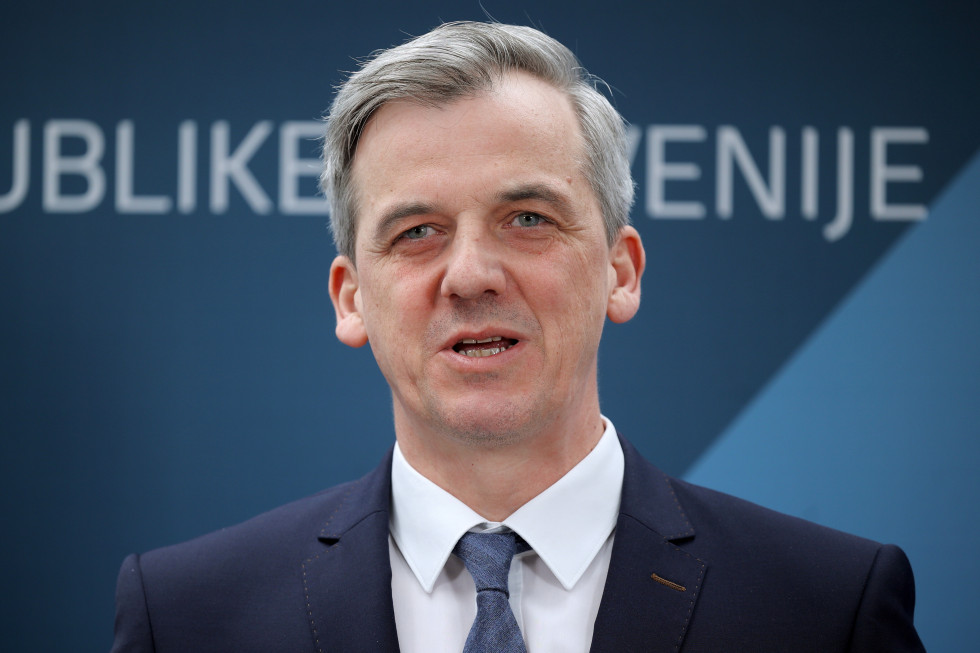97th regular session of the Government of the Republic of Slovenia

State Secretary in the Prime Minister's Office Danijel Levičar at the press conference after the government meeting | Author Daniel Novakovič/STA
The Government adopted the proposed new amendments to the Compulsory Motor Third-Party Liability Insurance Act, which are based on the new EU legislation on motor third-party liability insurance and ensure better protection of injured parties in the event of accidents or insolvency of insurance undertakings. The amendments to the Directive updated the definition of vehicles for which motor third-party liability insurance is obligatory.
The proposed new amendments to the Market in Financial Instruments Act transpose into Slovenian legislation the most recent amendments to the EU Directive on markets in financial instruments, based on which the definition of financial instruments was expanded to include those issued using distributed ledger technologies. The expansion of the definition of financial instruments to include instruments issued using distributed ledger technologies is laid down in the EU Regulation on a pilot regime for market infrastructures based on distributed ledger technology. The use of this technology can accelerate and combine trading and settlement in near real-time and enable the combination of trading and post-trading services and activities.
The Government also adopted the proposal for new amendments to the Act Governing Aid to Businesses to Mitigate the Impact of Energy Crisis, which set a new time limit for the payment of withheld funds in the amount of 20% of the total aid amount or the difference to the total aid amount to which a beneficiary is entitled under Article 16 of the Act. Due to the complexity of examination, it was not possible to examine all the applications by the time limit set in the Act, i.e. 28 February 2024. The new time limit for the payment of withheld funds is 31 August 2024.
The Government also set out the text of the draft Act Amending the Public Sector Salary System Act, amending Annex 1 to increase the value of pay scale grades by 3.36%, based on the data on the growth of consumer prices published by the Statistical Office on 29 December 2023. This amendment to the Act constitutes the implementation of point 1 of the Agreement and fulfils the obligation to negotiate on the adjustment of pay scale grades referred to in Article 5 of the Public Sector Salary System Act for 2024.
It has adopted an Immigration Strategy, which sees immigration as a general and permanent social phenomenon, recognises the development potential of immigration, and makes respect for fundamental human rights and dignity a basic guiding principle in dealing with immigration.
The Government adopted a draft Resolution on the long-term peaceful use of nuclear energy in Slovenia, entitled "Nuclear Energy for the Future of Slovenia". The Resolution sets out key objectives and policy orientations for the integration of the long-term peaceful use of nuclear energy into energy, research, higher education and other national strategies, and in particular for the long-term and safe operation of existing nuclear facilities and the establishment of an open and transparent dialogue with all stakeholders. The purpose of the Resolution is to provide a framework with guidelines for the long-term peaceful use of nuclear energy in the Republic of Slovenia. The Resolution commits to a transparent, clear and inclusive process for the development of legislation and policy for the peaceful use of nuclear energy, based on experience, scientific research, safety standards and public support. At the same time, it recognises the need to modernise the existing nuclear programme by involving all stakeholders, including education system institutions, research organisations, the regulator, investors, business, non-governmental organisations and the general public, in order to accelerate the preparation of new nuclear investments. The Resolution will be the basis for a quality and informed decision-making process in the referendum.
It also issued a Decree on detailed spatial planning rules for the siting of photovoltaic installations and solar energy receivers. The detailed spatial planning rules for the siting and installation of photovoltaic installations and solar energy receivers are directly applicable to the authorisation and the carrying out of activities affecting the environment. The siting of photovoltaic installations shall also be permitted on undeveloped building land intended for commercial activities, until such a time as the construction for commercial activities is carried out. In 2022, 12,698 solar power plants with a total capacity of 227.6 MW were connected to the system, and in 2023, 18,034 solar power plants with a total capacity of 411.8 MW were connected. As of 31 December 2023, a total of 49,092 solar power plants with a total capacity of 1,104.5 MW are included in the system (i. e. individual solar self-supply power plants, community solar self-supply power plants and metered solar power plants). In the European Cohesion Policy Programme for the period 2021–2027, EUR 60 million is earmarked for solar electricity generation. The adopted Decree will help facilitate the use of these incentives and the increase of renewable energy in Slovenia.

